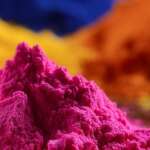In the world of plastic transformation and the coatings industry, color is not just about aesthetics — it’s about functionality, identity, perceived value, and performance. And when it comes to precision, purity, and color control, Powder Pigments are one of the most flexible and concentrated options available.
In this article, we’ll dive deep into the universe of powder pigments, their applications, benefits, and the advantage of working with Multicolor, a company that for over 40 years has been a national reference in the development of pigmentation and additive solutions for the plastics industry.
What Are Powder Pigments?
Powder pigments are fine particles with high tinting strength, used to add color to various materials such as plastics, paints, rubber, cosmetics, and other compounds. Unlike liquid dyes or masterbatches, they are supplied in their most concentrated form, offering complete formulation freedom.
They are generally classified into two categories:
- Organic: brighter colors, higher gloss, good lightfastness.
- Inorganic: more opaque tones, greater chemical and thermal resistance.
The ideal choice depends on the application and the required technical performance.
Advantages of Multicolor Powder Pigments
Multicolor supplies powder pigments with full customization, batch traceability, quality control, and technical support.
Main advantages:
- High tinting strength
Provides intense colors even at low concentrations, with excellent visual yield. - Application versatility
Suitable for extrusion, injection, rotational molding, blow molding, calendaring, and various coatings. - Customized formulations
Developed according to resin type, finish, visual standard, and technical requirements. - Wide chemical compatibility
Applicable in PE, PP, PS, PET, PVC, rubbers, and industrial solvents. - Control over the final formulation
Ideal for companies seeking to adjust pigment, additive, and filler internally.
A Key Consideration: Unlocking Maximum Performance Requires Technical Process
Despite the advantages, using powder pigments poses an important challenge: fully extracting the product’s coloring potential.
Because they are supplied in raw form, pigments rely heavily on a company’s internal process and technical structure to achieve optimal performance. For this reason, converting pigments into masterbatches or microspheres is often recommended — these formats offer better dispersion and processing, providing stability, ease of application, and more precise coloring.
Therefore, choosing powder pigments requires well-controlled dispersion processes and expert technical support.
When Should You Choose Powder Pigment Instead of Masterbatch?
Powder pigment is ideal for companies that:
- Seek full control and customization of the formula
- Have in-house compounding capabilities
- Want flexibility to combine pigment, additive, and fillers
- Are willing to invest in process control to extract maximum performance
Masterbatch or microspheres are better suited for those seeking convenience, process safety, and immediate visual consistency.
Multicolor offers both formats and supports clients in choosing the best solution for their operation.
Applications of Powder Pigments
Used in sectors such as:
- Plastics industry: technical parts, packaging, household items.
- Paints and coatings: automotive, industrial, architectural.
- Cosmetics and personal care: soaps, makeup, pigmented creams.
- Rubber and footwear: soles, insoles, finishing components.
- Textiles: pigmentation of synthetic fibers.
- Food (indirect): plastic packaging for secondary contact.
Technical Process at Multicolor
Development of powder pigments at Multicolor follows strict steps:
- Selection of pigment base (organic or inorganic)
- Technical evaluation of the client’s application
- Compatibility testing with the polymer
- Preparation of customized samples
- Batch tracking and quality control
Safety and Compliance
All pigments are evaluated according to Anvisa, FDA, and applicable regulations for children’s products, automotive and agricultural industries. Safety and technical responsibility are core values at Multicolor.
Specialized Technical Support
Multicolor offers full support:
- Technical and visual analysis
- Development of the ideal formulation
- Application and performance testing
- Support during product approval
- Post-sales follow-up
This close support ensures process efficiency and consistent results.
Talk to Multicolor
If you’re looking for color with formulation freedom, specialized technical support, and over 40 years of market experience, talk to the experts in true pigmentation.
Multicolor – coloring possibilities with technique, flexibility, and confidence.




